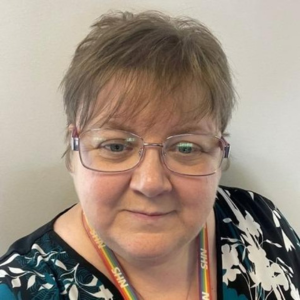
Donna Cuthbertson said she never intended on becoming a nurse.
She was studying for a degree in Business and Finance when she ended up getting a summer job that would change the trajectory of her whole career.
It was 1989 and Donna needed to earn some money whilst at university.
“I sent letters to my mum and asked her to send them to companies in the area to get me a summer job,” she explained.
“I ended up getting a job as a nursing assistant at Prudhoe Hospital, working on an assessment and treatment ward. I worked there every summer whilst I was at university.”
Donna was no stranger to Prudhoe Hospital; her mum also worked there as a learning disability nurse. Once she had finished her degree, Donna got a job there full time.
Four years later, she was ready for a change and moved to work on a medium secure ward at Northgate Hospital in Morpeth, where Donna said she loved every minute.
It was there that she did her nurse training and progressed to a staff nurse role. Then, the opportunity came to do a secondment with the speech and language therapy team at Northgate.
“This was great to see nursing from a different perspective and not just in a forensic setting,” Donna said. “After my secondment I went back to the ward as a clinical lead.”
Not long after returning to the ward, Donna decided it was time to move on.
“It was a very physical job; you needed a lot of energy to do the long days,” she explained. “I was in my 40s and had reached a point where I didn’t want to be working on the ward anymore.”
Donna joined the community learning disabilities team in Alnwick where she worked for two years, before starting her current role in 2017.
Now, she’s a primary care mental health liaison nurse manager. In this role, Donna works with many different teams and other NHS providers, working together to improve the physical health of people in Northumberland.
This can be through campaigns or working with clients directly.
“We’re very fortunate to work in the same place as adult social care; this means we can work collaboratively to improve the health inequalities for people with learning disabilities,” she added.
Many of the people Donna works with have mental health conditions, as well as learning disabilities.
She believes learning disability nursing is unique in its approach.
“It’s a lot more holistic,” she said. “We don’t put people in a box; we look at the whole person, rather than as someone with learning disabilities.”
Learning disability nursing has changed significantly in the years since Donna started her career.
“When I first started, patients were in dorms. There were over 20 people on a ward and everything was done as a collective, there was no individuality,” she said.
“Imagine the frustration of living with that many people who are all unwell. None of them have chosen to be together, they were put together because of their identified need.
“Now, care is a lot more personalised and collaborative. Experts by experience would have been unheard of back then but now we are driven by the service user. They are the ones receiving our support, so they can tell us what we’re doing well and what we can improve.”
For Donna, the best part of the job is being able to make a difference.
“Being able to improve someone’s life is a real honour. Whether it’s helping with their physical health or their living environment, the things that we might take for granted.
“We’re helping people live the life they want. It feels like a huge responsibility sometimes but there’s also a huge sense of pride.
“I might see someone out in the community who I worked with when they were an inpatient. Being able to follow someone’s journey and see their quality of life improve is so rewarding.”
Donna’s advice for someone thinking of a career in learning disability nursing is to go for it!
“You get back way more than you give,” she said.
“No training is easy, but the opportunity to improve not just one area but all areas of someone’s life makes it all worthwhile.”
